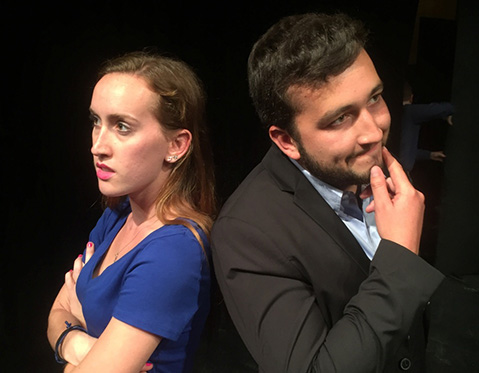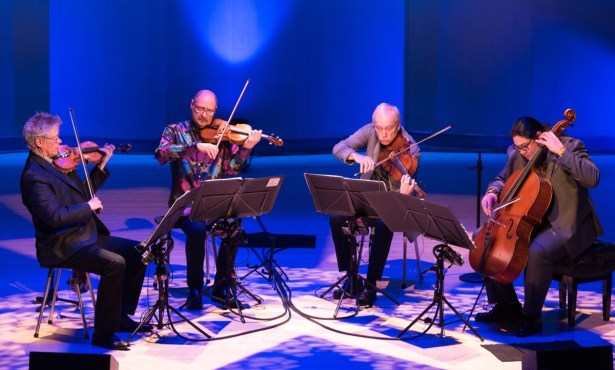‘Much Ado About Nothing’ at UCSB
Naked Shakes Tackles the Original Romantic Insult Comedy

Now entering its second decade, the Naked Shakes program at UCSB continues to offer exciting and innovative work that expands the range of what language-driven, textually faithful Shakespeare productions can be. Following last season’s monumental, Indy Award–winning The Death of Kings, Much Ado About Nothing, which opened this week, extends Naked Shakes director Irwin Appel’s vision of Shakespeare’s writing as a platform for creativity in the contemporary theater. Working closely with composer and pianist John Enrico Douglas, Appel and his student cast have crafted a show that’s more than just accompanied by live Latin music; it’s saturated with the sound and feelings of the global dance floor. A program note on the play’s location says it one way — “Setting: Messina (could be Cuba, could be Argentina, could be Miami, could be L.A., could be anywhere…)” — while in conversation, Appel put it in another, telling me that the show “starts with dancing, which then goes throughout,” adding that “the set is a dance floor, and one of the big scenes is a masquerade ball.” Credit this aspect of the production to another collaborating artist, UCSB professor Christina McCarthy, who provided the choreography for the whole show and designed the masks for the ball scene.
At the core of Much Ado About Nothing stand the bickering lovers Beatrice and Benedick. While it’s likely, given human nature, that without Shakespeare ever having created these characters and their technique of flirtation by insult, men and women would still be hitting on each other by putting each other down, there’s nevertheless no question that Beatrice and Benedick bear significant responsibility for the fact that we feel obliged to do so with some style. With senior BFA candidates Zachary Macias as Benedick and Maddie Martin as Beatrice, we are sure to get the full range of thrills out of some of Shakespeare’s most sparkling prose. Like Falstaff, the lovers speak in prose rather than iambic pentameter, and the unusual ratio of prose to verse in the play (70 percent of it is prose) is another thing that distinguishes Much Ado from Shakespeare’s other comedies.
This formal characteristic of Much Ado reflects something about the play’s themes, as well. Prose is associated with plain speaking and getting to the point, rather than talking in versified, metaphorical circles, and in his comedies, according to Appel, “Shakespeare liked to depict comic characters who tell it like it is; this is another way in which both Beatrice and Benedick are like Falstaff.” Ultimately, the story’s center of gravity resides with Beatrice, the trash-talking orphan whose gift for repartee comes with an edge of menace that’s not always hidden behind a humorous façade. Consider her expostulation in the opening scene of Act IV upon learning that Claudio has broken off with his fiancée, Hero, over an unsubstantiated (and false) accusation of infidelity: “O God that I were a man! I would eat his heart in the market-place.” That Beatrice should be frustrated by the degree of dependency forced on women in a male-dominated society is to be expected; the ferocity of her response nevertheless takes one by surprise. It’s just this wild imaginative freedom, closely allied to but also distinguishable from her anger, that makes Beatrice one of Shakespeare’s most compelling figures. Trapped in a culture that gives her few options, she backs into love, cursing and insulting her partner all the way to the altar. When at the end Benedick succeeds in finally closing her scandalous mouth with a kiss, it’s still not clear that she has submitted to a system in which the men make all the rules, and this is why Much Ado About Nothing remains an iconic and even a proto-feminist classic.
4·1·1
Much Ado About Nothing will be at the UCSB Studio Theater August 18-20 at 8 p.m. and August 20-21 at 2 p.m. Tickets are free but should be reserved in advance through theaterdance.ucsb.edu or by calling (805) 893-2064.



